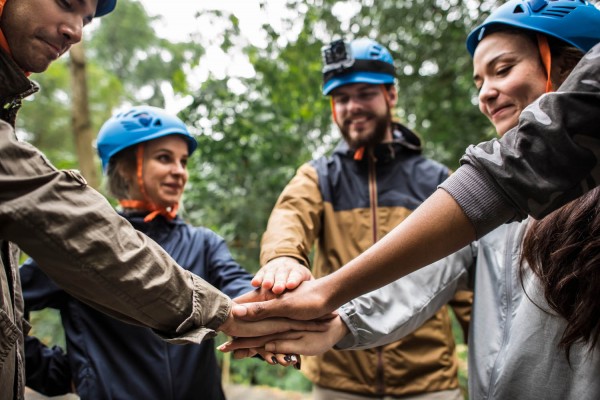Why a focus on team-building in a hybrid/remote work environment is crucial
There are multiple challenges that face us as we try and navigate managing hybrid and remote work environments. We know that it is imperative that we continually look at ways to keep employees engaged, and one of those strategies is to participate in team-building activities.
Firstly let us look at what team-building actually is and then we can look at how it can add value to our employees.
What is team-building:
Team-building can be used to describe various types of activities used to increase motivation, promote cooperation and enhance social relations. These such activities look at ways to improve the way in which a group of people work together effectively.
The overall concept of team-building is something that we all should be aiming for. We know that a team is greater than the sum of all of the individuals. So to achieve success and to bring out the best in our team, our focus needs to be on team-building.
The figures:
Over the past couple of years, data has been collected as to how our employees are finding hybrid and remote working environments. Largely, there have been a lot of positive things to report, from greater flexibility to feeling more focused. However, there are some statistics we need to pay close attention to that we can help to improve.
59% of hybrid workers and 56% of remote workers report having fewer ‘friendships’ since moving to this way of work.
Without intervention, remote work can decrease collaboration by up to 25%.
37% of employees fear that remote work means less visibility to leadership.
The top remote-work challenges have been reported by CEOs to be maintaining culture, enabling collaboration, managing work/life balance and fostering creativity.
As you can see there are some critical areas to focus on when it comes to effectively managing a remote/hybrid work environment. The good news is, that incorporating team-building activities can help to address some of these challenges.
Let’s take a look at some of the benefits of engaging in team-building activities.
Benefits:
- Breaks down barriers
Team-building activities are a great way to get people out of their comfort zone, break the ice and at the same down break down any barriers. For a lot of people working in a remote or hybrid environment, they may not have had much of an opportunity to connect with their colleagues outside of online meetings and emails. What better way of getting people interacting than participating in a novel activity.
- Improves communication
Probably one of the most common outcomes of team-building activities is an improvement in communication within the team. These activities act as a way to connect people that maybe they wouldn’t normally cross paths with or haven’t associated with before. Encouraging these interactions is very important as communication is a vital aspect of a high performing team environment. In fact, studies reveal that socialising between team members improves communication patterns by more than 50%.
- Reveals hidden talents
These activities can create great opportunities to uncover hidden talents. Often strengths, and weaknesses, are easier to highlight outside of the usual working environment. Understanding these for not only the individual themselves, but for their teammates too, enables an increased ability to delegate and collaborate effectively by playing to each other's strengths.
- Fosters relationships
Team-building events offer the opportunity to connect with your colleagues outside of the formal work environment. It allows for employees to delve a little deeper into who the individuals are that they work alongside with every day and get to know them better. It also helps to build diverse relationships as well, putting people into teams who perhaps wouldn’t normally gravitate toward one another is a great way to learn more about your whole team.
- Builds trust
Trust in someone all starts with having an understanding of who that person is. If we don’t take the time to know our colleagues and appreciate what they can do it is often hard to trust them. We know that teams who work together have greater success and that means trusting that your teammates will share the load. Team-building activities promote a greater understanding of our colleagues and they shine a light on individual talents and attributes.
- Increase collaboration
Another major outcome of being involved in a team-building activity is an increase in collaboration. These such activities often require a whole team effort to solve puzzles, crack a code or complete various challenges. These activities cannot be completed alone, and successfully finishing many of the games requires communication, cooperation, delegation and working together collaboratively towards the common goal. Sound familiar? These are all the things you are trying to achieve within a work environment, but take the team outside of the usual ‘office’ and often any challenges that were faced previously are approached differently.
- Improve creativity
Often these activities involve thinking outside the box and using your brain in a different way than you usually would. This lateral thinking and creativity are not always easy to access, so often a team-building activity that is novel and gives you puzzles or challenges to solve can let that creativity out! They are great ways to allow teams to brainstorm together and foster innovative thinking.
- Improves team culture
With 36% of executives noting their biggest challenge to hybrid work is the loss of culture, we need to focus on ways to improve it. Luckily, team-building does just that. It breaks up the usual working week, shifts people’s minds away from their day to day tasks and allows colleagues to bond over something other than their shared work responsibilities.
- Increase engagement
One of the biggest concerns for managers looking after remote and hybrid teams is maintaining employee engagement. We’ve looked at several ways previously to boost employee engagement remotely (read the article here), and we know that team-building events are one of the most effective ways of doing that.
- Increase in employee loyalty
This is promising news considering 88% of executives feel they have experienced a higher turnover in the past couple of years. When people believe in the purpose and shared mission of their team they are willing to go through the good and bad as a team. Team-building events are a great way to focus on company values or team goals and create a sense of camaraderie between colleagues. This sense of belonging increases employees' loyalty to the business and likewise an increase in dedication to their work.
Things to remember:
- Participate regularly
Unfortunately, partaking in just one standalone team-building activity isn’t going to be enough. The continued use of these events/activities is the best way to reap the benefits for your team. Strategically plan them throughout the year and align your goal for each event with what is happening in the work calendar. Maybe you all come together for a team-building activity right after a new product launch to celebrate, maybe you do it when you have a wave of new hires as part of an induction process. Be sure you utilise them regularly to allow your team to gain the most benefit from them. - Ask for feedback
It’s all good and well coming up with all the ideas yourself, however, if it doesn’t align with your team, then the purpose of the event may get lost. You could consult the team during the preparation phase and give them the choice of a few options when it comes to activities. Getting them involved in the planning process is also going to increase participation when it comes to the event itself. Also, getting the participants to provide feedback after each event is going to see if you are achieving your intended goals, this will help to effectively plan out the next event. - Encourage day to day interaction
Team-building shouldn’t have to wait for designated days or activities to be front of mind. There are small things you can do each day or even each week to promote interaction, communication and collaboration. Encourage the use of social channels to simulate the ‘water-cooler’ chat. You could dedicate the first 5 minutes of team meetings to fun little social games. Some examples of these are 2 truths and a lie, word associations, joke sharing etc. - Don’t forget to meet face to face
Just because the team works remotely doesn’t mean they shouldn’t still come together and interact in person from time to time. In fact, studies have shown us that when asked why people liked going to work, 26% of employees said that it was because they enjoyed meeting their co-workers face to face. Encourage face to face get-togethers where possible. Again, this doesn’t have to be reserved for formal events/activities, but even coming together to celebrate a birthday together, having lunch together or even going for walking meetings for those that live nearby, all provide value.
Summary:
This should make it explicitly clear as to the reasons why focusing on team-building in remote/hybrid work environments is critical. Per capita, Australia is the #3 country investing in virtual team-building, so there’s something to it, make sure you don’t get left behind!
If you need further information on how to plan a remote or hybrid event check out our previous blog post with further advice on just how to do that. Or you can even speak to one of us and we can assist you in utilising team-building activities with your remote or hybrid staff!

Emily has a background in corporate sales and recruitment. Experience, that allows her to understand businesses and people, and to create compelling copy and content that showcases just that.
Let's do this
Enquire now
Add activities to your quote, or just tell us what you want to do.

